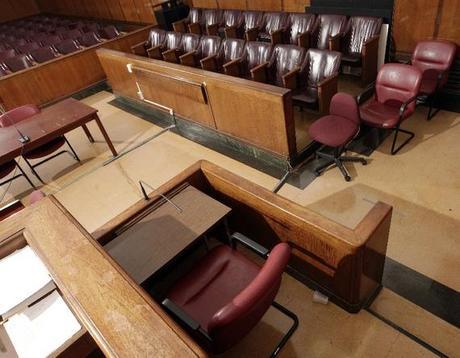
Chip East/Reuters
Harsh Sentences Are Killing the Jury Trial
As they coerce defendants into making plea bargains, prosecutors are also shutting everyday Americans out of the justice system.ANDREW GUTHRIE FERGUSONDEC 6 2013This week’s release of the Human Rights Watch Report, “An Offer You Can’t Refuse,” confirms that harsh sentencing laws have undermined the American jury system. On average, 97 percent of defendants plead guilty in federal court. For crimes that carry a minimum mandatory sentence, going to trial has simply become too risky. As Human Rights Watch reports: “Defendants convicted of drug offenses with mandatory minimum sentences who went to trial received sentences on average 11 years longer than those who pled guilty.”
This risk goes well beyond the traditional trade-offs. Plea offers have been around since the 1800s and are a well-established and necessary part of criminal practice. But the new mandatory minimums and sentencing enhancements have given federal prosecutors new power to coerce pleas and avoid trials. A prosecutor can now give a minor drug dealer this choice: “Plead guilty to a reduced charge, or go to trial and risk sentencing that will put you in jail for decades.” It’s not hard to understand why so many defendants—whether innocent, guilty, or not quite as guilty as charged—are taking the first option.
Lawyers call this “the trial penalty,” and even Supreme Court justices like Anthony Kennedy have concluded that “criminal justice today is for the most part a system of pleas, not a system of trials.” The cost—in terms of money and lives—has been noted by leaders on both sides of the political aisle, and has drawn the attention of Attorney General Eric Holder, himself, who has begun the process of rethinking some of the charging guidelines for mandatory minimum sentences.
But, there is a secondary cost that is less often discussed but equally damaging to the criminal justice system. Harsh sentencing laws are killing the jury trial. And without trials, citizens have no say in the criminal justice system.
It is no accident that the jury trial is the only constitutional right to make a repeated appearance in the original Constitution and the Bill of Rights. The founding fathers considered criminal juries to be the best mechanism for checking the power of judges and lawyers. By interposing citizens between a prosecutor and a conviction, the constitutional system protected individual liberty. This is not to say that colonial juries did not convict people quite regularly, and quite harshly. But when they did, citizens, not prosecutors, were the ones condemning the law breakers. It was this local, public participation that gave legitimacy to the larger system.
The modern domination of plea bargains has excised the role of the citizen-juror. Without trials, citizens do not learn about what is happening in the criminal justice system, and they have no way of taking part in it. Instead of seeing the consequences firsthand, ordinary Americans must rely on research reports and news stories. This practice disconnects the people from their own democratically enacted laws, precluding them from evaluating these elective choices.
Unlike trials, plea bargains take place in secret, away from public scrutiny. They involve negotiations between repeat players in the system—the lawyers. And for many types of crimes, the bargains are influenced by federal policies, not local ones. Thus, the jury system—with its emphasis on local authority and public participation—has been replaced with a system as insular as it is broken.
So what should be done? And who should do it? Although the HRW report paints revealing pictures of many men and women facing incredibly long sentences for non-violent crimes, defendants in federal criminal cases are, generally, not a sympathetic group. Legislators have little incentive to move away from tough-on-crime policies, despite growing cost concerns and disproportionate impacts on certain communities. On the other hand, prosecutors have every incentive to preserve their discretionary power, since they’ve largely benefited from the existing system. So who will make the necessary changes?
The answer lies in our own history. The push for jury trials in the Bill of Rights came from citizens—not judges, politicians, or prosecutors. In fact, the perceived lack of citizen involvement in the legal system almost derailed the original Constitution, as Anti-Federalists saw it as a threat to their liberty. Concerned citizens wrote, organized, and protested on behalf of their own role in the justice system. They won, and that victory can still be read in the Sixth Amendment, which promises in rather emphatic terms that “in all criminal prosecutions, the accused shall enjoy the right to a speedy and public trial, by an impartial jury of the state and district wherein the crime shall have been committed.”
Today, Americans of all political persuasions should embrace a greater role for juries, at least when it comes to federal prosecutions. After all, Tea Party conservatives believe in local, accountable government, while progressive liberals believe in an equitable system of justice. More jury trials will mean more ordinary people engaged in the legal system—more citizens involved in their government. The result will not only be consistent with the original design of the Constitution but, like the jury system, itself, will encourage more local, democratic, participatory engagement with our government and its policies.
